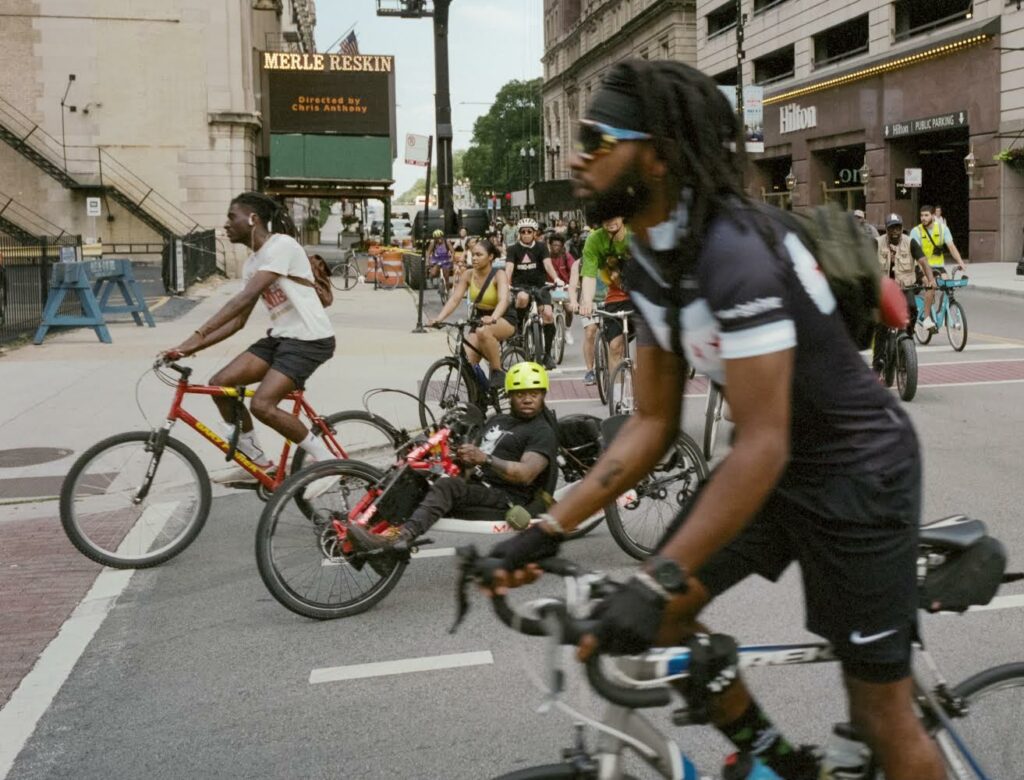For Shawnee Dez, biking is about collective liberation. Four years ago, Dez founded Black JoyRide, a massive group bike ride that takes place yearly on Juneteenth with additional social rides throughout the year.
“The dream is large and vast, but at the core, it is to use biking as a tool to connect more Black people to each other,” said Dez. “By way of connecting more Black people, we’re connecting more of our neighbors in our community, whatever their ethnicity is.”
Biking has always been an avenue for Dez to access self-care and freedom. As a child growing up in Jeffery Manor, riding her bike was a way to move beyond the confines of her block and have a taste of independence.
At the height of the COVID-19 pandemic and global racial uprisings in summer 2020, Dez and her friends were desperate for healing human connections. When the murder of nineteen-year old Florida community activist Oluwatoyin Salau made national news that June, Dez took to the streets not to protest in a traditional sense but to offer her community an alternative way to process grief—through biking. With the support of her co-planner David Marby and other co-creators, the first Black Joyride was organized in just five days. On Juneteenth 2020, over 200 bikers gathered at the Johnson Publishing Building downtown and biked south to the DuSable Black History Museum and Education Center.
While Black JoyRide promotes joy and freedom, the biking group was also developed as a direct response to the violence and segregation experienced by Black communities both in Chicago and nationally. This discrimination extends to all areas of life including safe, accessible transportation. While Chicago generally ranks low in its bikeability and bike safety, this lack of safe infrastructure disproportionately affects riders on Chicago’s West and South Sides, with Black bikers making up almost half of all fatal crash victims.
“I think about riding through this city and the deep-seeded segregation and redlining that we experience and the hyper awareness and hypervigilance of most Black people [and] Black women even more specifically,” said Dez. “Mobility is important: moving the body, moving through heavy emotions, [and] doing this with a group of people can all get us out of this place where we feel helpless.”

This year, as I mounted my bike to join the fifth-annual Juneteenth ride from the Formal Gardens to the Salt Shed’s Black Freedom Market, the collective power of biking down Michigan Avenue with dozens of melanated people made me feel safer than I’d ever felt biking in the city. Moving into its first year as a collective, Black JoyRide continues to promote mental and physical wellness with group bike rides happening during Chicago’s warmer months. In partnership with local community organizations, group rides show off the beauty of South Side neighborhoods and educate riders about important local initiatives.
When asked about dreams and visions for the initiative, Dez shared her goal to one day take the biking group across state lines to connect with biking communities in other cities. She hopes Black JoyRide can become a physical bike shop on the South Side—a spacer where, in Dez’s words, “community is made even more possible.”
You can follow @blackjoyride on Instagram for updates about upcoming rides.

